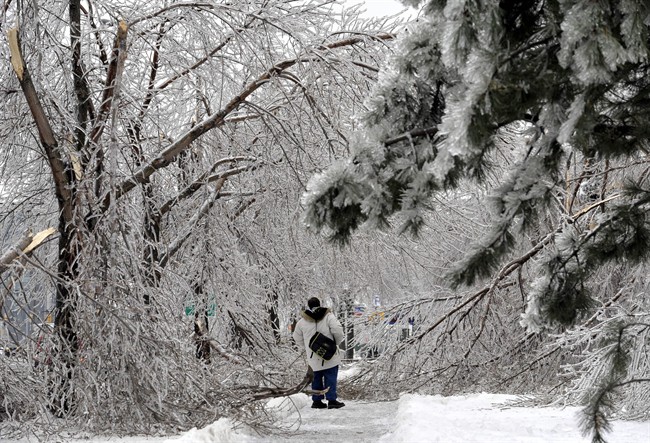TORONTO – This has been an interesting winter. Alberta has had blizzards; Saskatchewan and Manitoba have had long, colder-than-normal temperatures; and eastern Canada has had ice storms and blizzards. For many, spring can’t come too soon.

But on the bright side, the winter has certainly expanded our vocabulary.
From ice storms to loud booms in the night to the Arctic cold, we can thank Mother Nature for introducing us to a few new winter weather terms.
Ice accretion
The addition of layers of ice due to freezing rain.
This word was thrown around during the Dec. 22 ice storm that struck southern Ontario, Quebec, and the Maritimes.
Accretion was responsible for bent trees, downed power lines, and icy roads that wreaked havoc across the regions. As the rain fell and froze on the much colder objects, it built up in layers, weighing down anything it touched.
Frost quake
This rare phenomenon became an everyday word for those in southern Ontario following the ice storm.
Frost quakes occur when the ground becomes saturated with water and then experiences a sudden freeze. The water, having nowhere else to go, cracks rock and soil and causes a loud boom or crack that can be heard and felt in homes.
READ MORE: Mysterious Christmas Eve ‘boom’ heard and felt around GTA
On Dec. 24, there were widespread reports of these strange booms from west of Toronto all the way into Quebec.
People were jolted out of bed after hearing a loud bang that seemed to emanate from their roofs. Many believed a tree had fallen on their homes. But instead, it was a bad case of the shakes for Mother Nature.
As temperatures rose (melting the ice from the storm), and then dropped to -20 C or colder in the subsequent weeks, more of these frost quakes were reported.
But it wasn’t all bad: Ontarians got a new beer out of it.
Polar vortex
Two words that many people from Saskatchewan through to eastern Canada would rather not hear together.
The polar vortex brought much of Canada and the U.S. to their winter weather knees after it left its happy home in the Arctic.
Though not an unusual phenomenon, the polar vortex usually resides in the Arctic. But in the beginning of January, it packed its bags and headed south, bringing its frigid Arctic air and temperatures near -20 C or colder. Some parts of Saskatchewan, Manitoba, and Ontario experienced wind chills near -50 C.
- Posters promoting ‘Steal From Loblaws Day’ are circulating. How did we get here?
- Video shows Ontario police sharing Trudeau’s location with protester, investigation launched
- Canadian food banks are on the brink: ‘This is not a sustainable situation’
- Solar eclipse eye damage: More than 160 cases reported in Ontario, Quebec
READ MORE: Polar vortex – The unwanted winter guest who refuses to leave
It returned home for a few days in January, before heading back south over the three provinces, though it didn’t stretch as far south into the U.S. as it had the week before.
Snow rollers
These cool snow balls were reported across the U.S. on Jan. 27 and 28 when people found the mysterious cylindrical balls scattered around lawns and hills.
READ MORE: Another cool winter phenomenon – snow rollers
Snow rollers are rare because there are very particular criteria that are needed to be met for them to form: the ground must be covered by a layer of ice; the ice must be covered by a thin layer of wet, loose snow; the ground must also be at a temperature near 0 C; the wind must be strong enough to roll the snow; and there must be a bit of a slope to the ground in order to get the snow rolling.
But imagine how cool it would be to walk outside and see these all over your lawn.
#@$^*
Not unusual to hear this off-season, however this year it’s been mainly used when:
a) temperatures dip below -20 C
b) there’s no salt to be found
c) a frost quake (see above) wakes you up from a deep slumber
d) a forecast calls for more snow
e) a road or highway has been closed







Comments